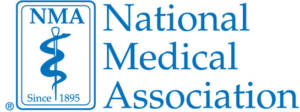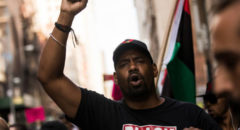 Silver Spring, MD (July 18, 2016) – The National Medical Association (NMA), representing over 50,000 predominantly African American physicians nationally, are deeply concerned by the recent and past incidents of Police Use of Lethal Force in the execution of their duties. The NMA is cognitive of the tremendous contributions of law enforcement officers in preserving communities at great personal sacrifice as well as exposing themselves on a daily basis to potential danger and life threatening situations. In addition, the NMA decries the violence against police officers and calls for the end of criminal and amoral attacks on police, as exemplified by the recent shooting deaths of Baton Rogue and Dallas law enforcement officers. The NMA calls for measures that will deflect both of these forms of violence and end the cycle of violence between the police and the communities they are duty-bound to protect and serve. The NMA believes that violence, in particular the use of force by law enforcement, is a public health issue that disparately affects African Americans and communities of color as well as other vulnerable populations such as the homeless, the mentally ill, those who are under the influence of drugs or alcohol, the poor and teenagers. In 2015 the NMA House of Delegates passed a resolution on Lethal and Sub-Lethal Injury Resulting from Law Enforcement Altercations. This resolution calls for the uniformity of training of law enforcement as well as the uniformity of tracking and reporting deaths in custody.
Silver Spring, MD (July 18, 2016) – The National Medical Association (NMA), representing over 50,000 predominantly African American physicians nationally, are deeply concerned by the recent and past incidents of Police Use of Lethal Force in the execution of their duties. The NMA is cognitive of the tremendous contributions of law enforcement officers in preserving communities at great personal sacrifice as well as exposing themselves on a daily basis to potential danger and life threatening situations. In addition, the NMA decries the violence against police officers and calls for the end of criminal and amoral attacks on police, as exemplified by the recent shooting deaths of Baton Rogue and Dallas law enforcement officers. The NMA calls for measures that will deflect both of these forms of violence and end the cycle of violence between the police and the communities they are duty-bound to protect and serve. The NMA believes that violence, in particular the use of force by law enforcement, is a public health issue that disparately affects African Americans and communities of color as well as other vulnerable populations such as the homeless, the mentally ill, those who are under the influence of drugs or alcohol, the poor and teenagers. In 2015 the NMA House of Delegates passed a resolution on Lethal and Sub-Lethal Injury Resulting from Law Enforcement Altercations. This resolution calls for the uniformity of training of law enforcement as well as the uniformity of tracking and reporting deaths in custody.
Over the last two years the public has been made acutely aware of police actions which have resulted in the unjustified killing of innocent unarmed African American men. Though Philando Castile and Alton Sterling are the most recent victims to perish as a result of the actions of police officers, they are unfortunately on a long and growing list of citizens to suffer this fate. The NMA deplores this unjustified use of excessive and often lethal force. Now the NMA announces the development of the Working Group on Gun Violence and Police Use of Force dedicated to establishing recommendations for comprehensive public health and criminal justice reform. This working group will set a clear violence prevention public health agenda for America while advocating for sensible gun reform. The work product will be geared towards decreasing the morbidity and mortality disparities associated with violence and police use of force within our communities.
We, as African American physicians, reject the notion that our communities must be policed in a way that results in increased injury, deaths and incarceration of so many of our patients. It is clear that instances of inappropriate force by police can lead to significant injury.
The injuries associated with police use of force occur during the:
- Pre-custody period (commission of a crime, during a fight, chase, and apprehension, during a siege or hostage situation, or during restraint or submission)
- In custody period (soon after being admitted to jail, during interrogation, during incarceration, or legal execution) AND:
- Post-custody period (revenge by police or rival criminals or after reentry into the community).
Injuries sustained by civilians at the hands of law enforcement include gunshot wounds, skull fractures, cervical spine injuries, facial fractures, broken legs, blunt trauma orbital floor fractures, laryngeal cartilage fractures, shoulder dislocations, cuts and bruises, concussions, hemorrhage, choking (positional or due to upper body holds), abdominal trauma, hemothorax, and pneumothorax . Complications of such injuries include post-traumatic brain swelling, infections following open fractures and lacerations, hydrocephalus due to blood or infection, as well as subdural and epidural hematomas and, in the most severe cases, death.
For these reasons a public health approach is critical to addressing the administration of force by police officers within communities subject to disparate practices. When an arrest is indicated, it is imperative that police officers are trained in techniques designed to safely restrain suspects, while protecting themselves from harm, with the goal of safe transport to police headquarters.Understanding the inherent stress involved in performing their duties, it is critical that police officers have an initial mental health assessment and ongoing psychological support services. As a result, we ask for the following:
- We ask that there be an immediate review and assessment of current state, local, and federal law enforcement hiring practices and their criteria for selection.
- We ask that there be immediate review and assessment of current state, local, and federal law enforcement training criteria, continuing education, mental health risk assessment, further development of psychological support services, bias mitigation, and conflict resolution protocols.
- We ask that specific federal appropriations be reinstated to the Centers for Disease Control and Prevention for basic research into the public health effects of gun violence.
- We ask that there be mandatory state, local, and federal adherence to H.R. 1447 – Death in Custody Reporting Act of 2013 amended to require the inclusion of independent Medical Examiner reports and the US Standard Death Certificate.
We support police officers and law enforcement officials who are working to address these critical issues. We commend them for their daily efforts to protect and serve their community, ensuring the safety of citizens.
As physicians, we believe violence is unacceptable under any circumstance. We ask that all demonstrations remain peaceful to protect the health and safety of citizens and law enforcement alike.
Contact:
National Medical Association
202-347-1895
###
Founded in 1895, the National Medical Association (NMA) is the nation’s oldest and largest medical association representing the interests of African American physicians and the patients they serve. The NMA advocates for policies that would assure equitable and quality health care for all people. For more information on the NMA visit, www.NMAnet.org









